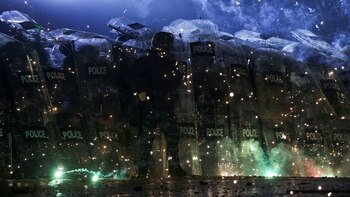(ATR) How much it will cost is the issue hanging over the planned site of the gold medal matches in ice hockey for the 2010 Olympics at General Motors Place in downtown Vancouver.
VANOC is in negotiations with General Motors Place owner Orca Bay Sports and Entertainment over the costs of renovations and rent for the 18,630-seat arena. The venue is also home ice for the NHL Vancouver Canucks.
The deal is the final venue contract on VANOC's to-do list.
VANOC has agreements with Vancouver, Richmond, West Vancouver and Whistler municipal authorities and Indian bands. VANOC is compensating Whistler and Blackcomb's owner Intrawest for lost business during the 2010 Games.
Negotiations with Orca Bay, however, could be the most complex of all.
Rows of seating would have to be removed and the ice cooling system expanded to accommodate an international-size hockey rink. Advertising, including the arena name, would be covered or removed in keeping with IOC "clean venue" rules.
GM a VANOC sponsor, would be among those to be compensated.
A Molson-Coors-sponsored brewpub at GM Place wouldn't be acceptable, because Anheuser-Busch products have exclusivity at Olympic venues.
The Canucks would have to spend three weeks or more on a road trip or find a temporary home outside Vancouver to accommodate the Olympics fit-out of the arena.
VANOC senior vice president of revenue, marketing and communication is Dave Cobb, former Orca Bay chief operating officer.
Protests Block Key Route to the Games
First Nation members staging a sympathy protest for a group on the other side of the country in Ontario closed Vancouver's Lions Gate Bridge during afternoon rush hour one day last week.
The Vancouver landmark links downtown with West Vancouver, site of snowboarding and freestyle skiing in 2010 and the start if the Sea-to-Sky Highway to Whistler.
The bridge's north end goes through a Squamish Nation reserve. Squamish is one of the so-called Four Host First Nations with representation on the VANOC board of directors.
VANOC CEO John Furlong downplayed the roadblock, denying that any member of the Squamish, or the other three tribes, was involved in the protest.
Furlong refused to speculate how any future roadblocks would impact venue construction or other preparations for the 2010 Games.
No Squamish chiefs have publicly condemned the protest.
Flags in support of southern Ontario Mohawk Indians have appeared on a Squamish reserve in North Vancouver. The Mohawks have blocked highways in a bid to stop a housing development on a disputed piece of land.
The four host First Nations in Vancouver have signed a protocol agreement with the Vancouver Olympics, but the Squamish, Musqueam, Lil'wat and Tsleil-Waututh do not have treaties with the provincial and federal governments and together claim ownership of the region stretching from Richmond to Whistler.
VANOC's deal is intended to ensure the Olympics can be built and staged on First Nations traditional territory.
Members of the Lil'wat blocked highway construction north of Whistler in 1990 and some were also involved in the 1996 armed standoff at Gustafsen Lake in B.C.'s Interior. The Canadian army was called to quell the latter incident.
Reported by Bob Mackin in Vancouver
Your best source of news about the 2010 Olympics is www.aroundtherings.com, for subscribers only.
Últimas Noticias
Sinner-Alcaraz, the duel that came to succeed the three phenomenons
Table tennis: Brazil’s Bruna Costa Alexandre will be Olympic and Paralympic in Paris 2024

Rugby 7s: the best player of 2023 would only play the medal match in Paris

Rhonex Kipruto, owner of the world record for the 10000 meters on the road, was suspended for six years

Katie Ledecky spoke about doping Chinese swimmers: “It’s difficult to go to Paris knowing that we’re going to compete with some of these athletes”




